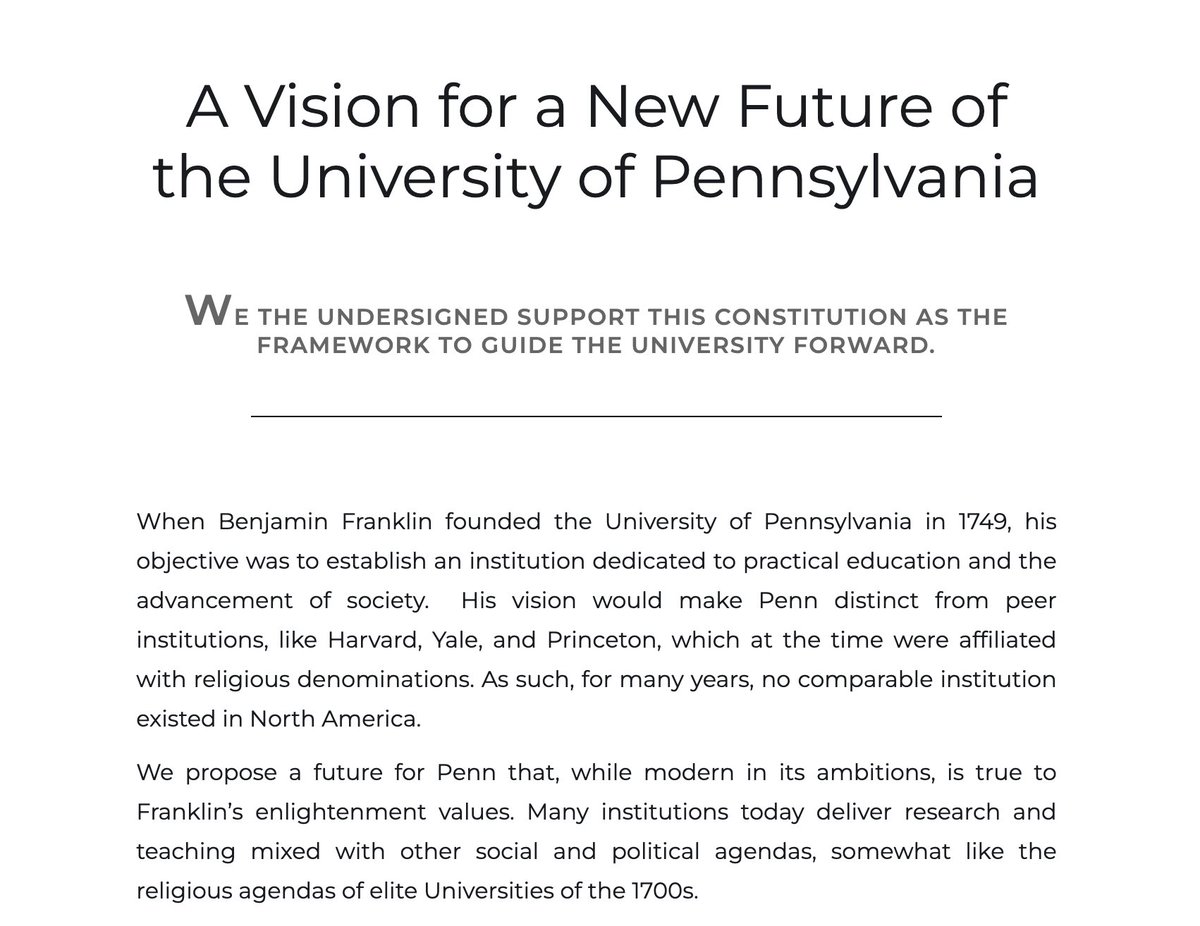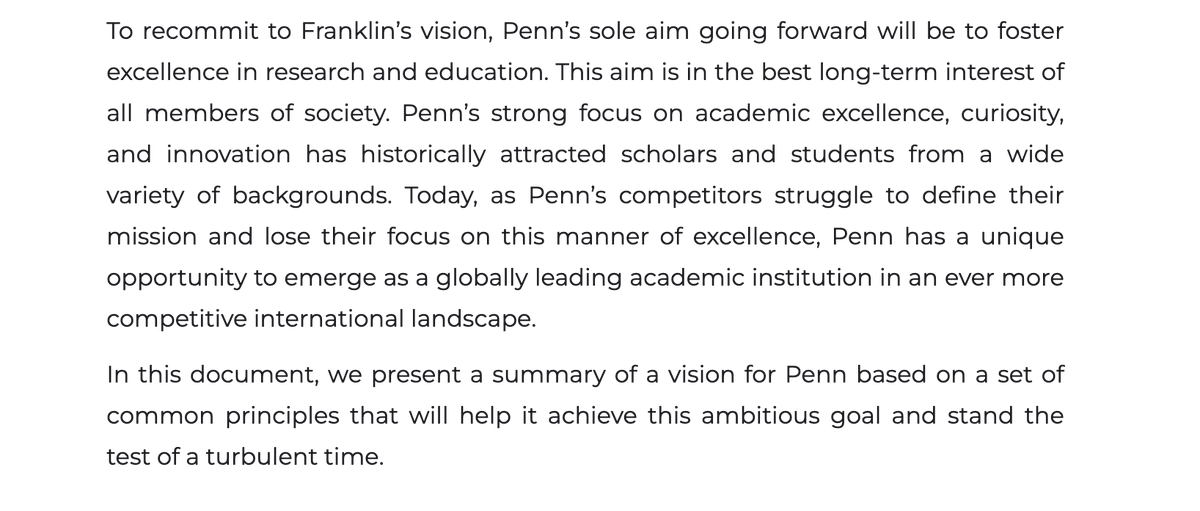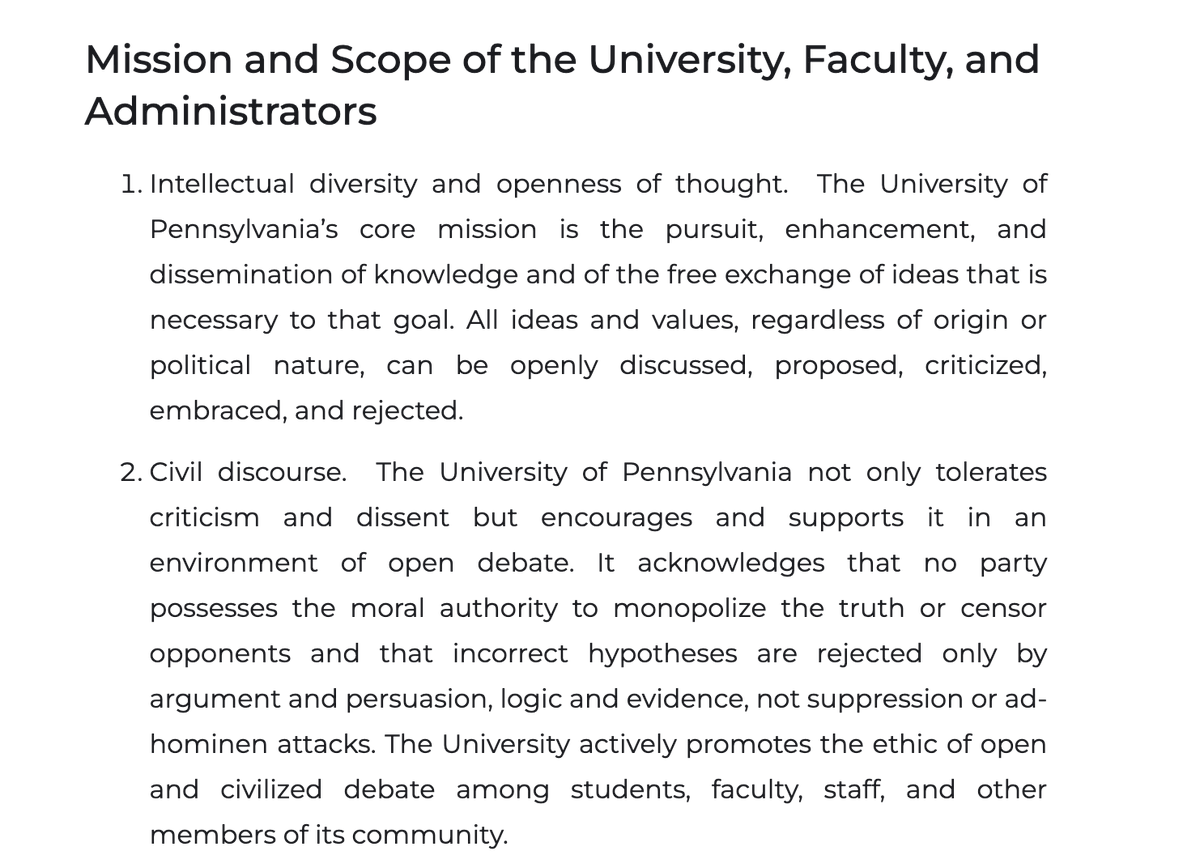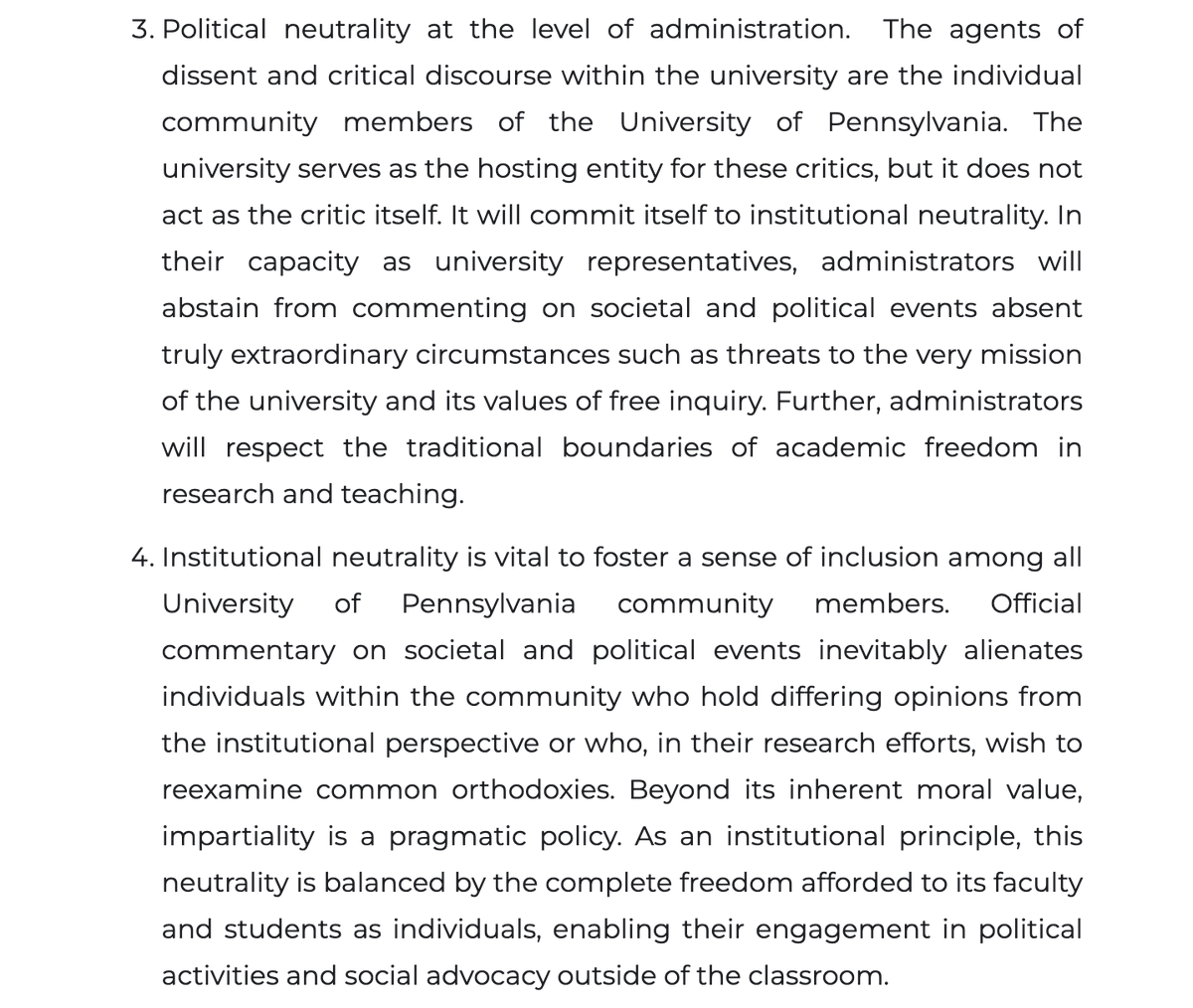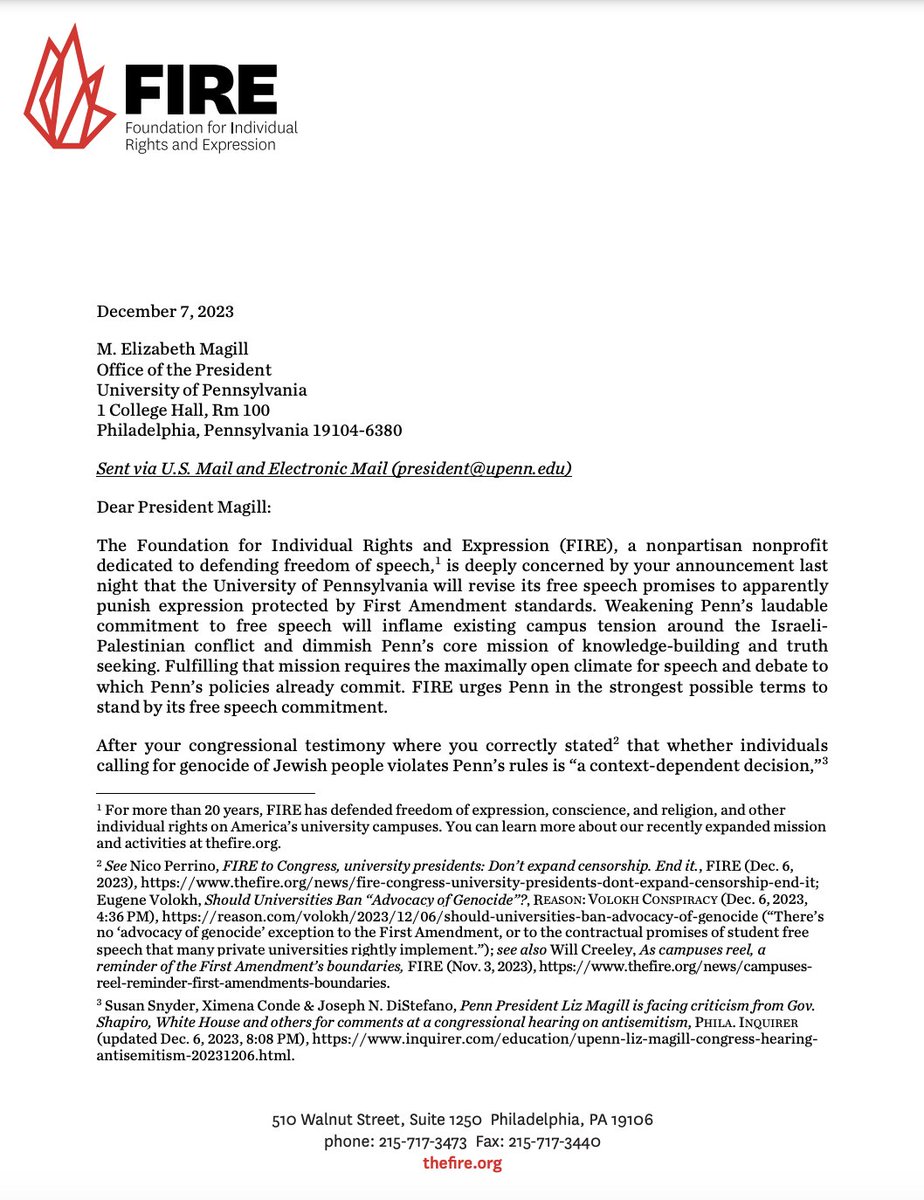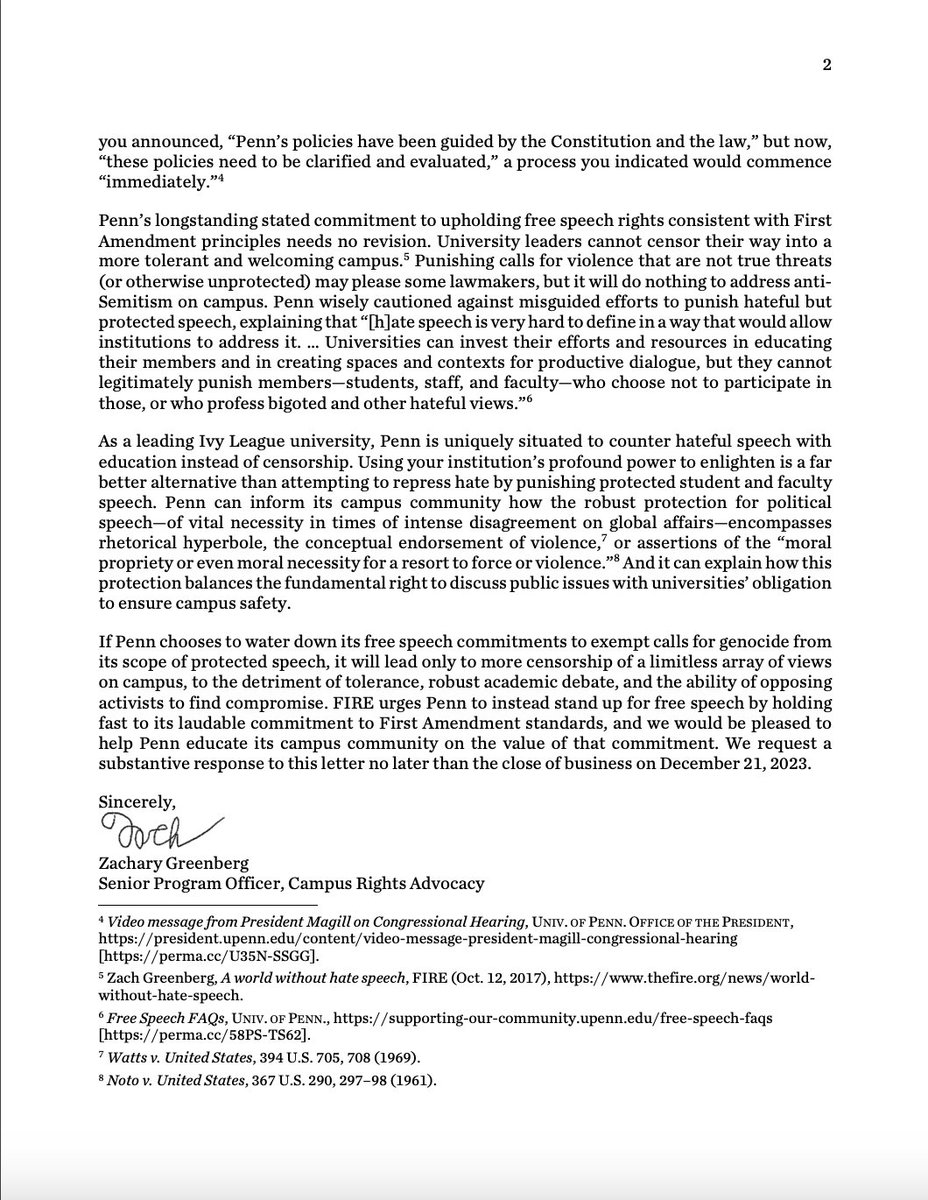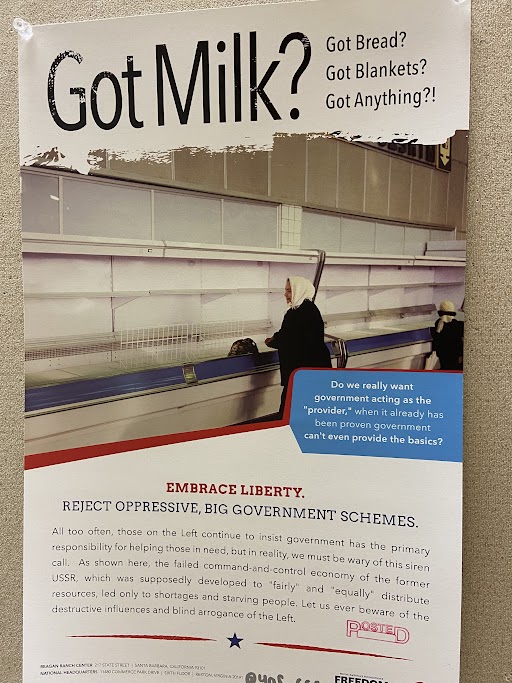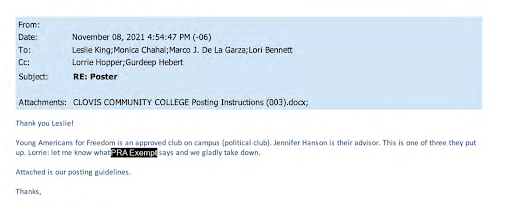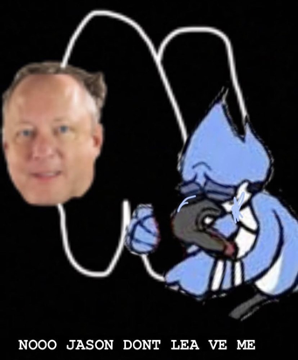🧵: In every crisis is an opportunity.
As confidence in higher ed reaches historic lows, it is time for campus leaders to re-establish their institutions as communities devoted to the discovery, preservation, and dissemination of knowledge.
Here’s where they should start ⬇️
As confidence in higher ed reaches historic lows, it is time for campus leaders to re-establish their institutions as communities devoted to the discovery, preservation, and dissemination of knowledge.
Here’s where they should start ⬇️
1. Stay true to the college’s mission
The search for knowledge is at the center of higher education’s purpose.
When controversy strikes, institutions must reflect on their truth-seeking mission and use it to ground their response. College leaders who stray from their institution’s mission and try to please everybody, please nobody.
The search for knowledge is at the center of higher education’s purpose.
When controversy strikes, institutions must reflect on their truth-seeking mission and use it to ground their response. College leaders who stray from their institution’s mission and try to please everybody, please nobody.
2. Protect free speech in policy
For knowledge generation to occur, free speech and academic freedom must flourish.
Colleges must cultivate an environment where students and faculty are free to “think the unthinkable, discuss the unmentionable, and challenge the unchallengeable.” This freedom is essential to root out error, confirm truth, and establish trust.
Public colleges, as government actors, are bound to protect free speech and academic freedom under the First Amendment, while private colleges should look to the First Amendment’s wisdom in drafting their policies.
For knowledge generation to occur, free speech and academic freedom must flourish.
Colleges must cultivate an environment where students and faculty are free to “think the unthinkable, discuss the unmentionable, and challenge the unchallengeable.” This freedom is essential to root out error, confirm truth, and establish trust.
Public colleges, as government actors, are bound to protect free speech and academic freedom under the First Amendment, while private colleges should look to the First Amendment’s wisdom in drafting their policies.
3. Protect free speech in practice
Even institutions that protect free speech and academic freedom in policy too often fail to do so in practice.
When demands for censorship arise, college leaders must remind their campus community that free speech is essential to the mission of the college. When leaders do this loudly, clearly, early, and consistently, censorship demands dissipate.
When leaders fail to do so — or when they give into demands for censorship — the demands grow and future calls for censorship are incentivized.
Even institutions that protect free speech and academic freedom in policy too often fail to do so in practice.
When demands for censorship arise, college leaders must remind their campus community that free speech is essential to the mission of the college. When leaders do this loudly, clearly, early, and consistently, censorship demands dissipate.
When leaders fail to do so — or when they give into demands for censorship — the demands grow and future calls for censorship are incentivized.
4. Adopt institutional neutrality
College administrations and departments should not adopt institutional positions on contentious social and political issues.
When colleges adopt official institutional positions on issues outside their mission, they risk establishing a campus orthodoxy that chills speech and undermines the knowledge-generating process.
By not tethering itself to a particular position, on the other hand, the neutral college welcomes the fullest range of views — and reaps the benefit of the wisdom produced by the resulting debate. As the @UChicago's “Kalven Report” puts it, “The university is the home and sponsor of critics; it is not itself the critic.
College administrations and departments should not adopt institutional positions on contentious social and political issues.
When colleges adopt official institutional positions on issues outside their mission, they risk establishing a campus orthodoxy that chills speech and undermines the knowledge-generating process.
By not tethering itself to a particular position, on the other hand, the neutral college welcomes the fullest range of views — and reaps the benefit of the wisdom produced by the resulting debate. As the @UChicago's “Kalven Report” puts it, “The university is the home and sponsor of critics; it is not itself the critic.
5. Center free speech values in hiring and admissions
Student and faculty applicants must understand that practicing and defending scholarly values is central to a college’s mission.
Curiosity, dissent, devil’s advocacy, thought experimentation, and talking across lines of difference are all essential to a liberal arts education. Institutions should clearly explain and prioritize these values in the hiring and admissions processes so there is not a mismatch between expectations and the reality of a liberal education.
Student and faculty applicants must understand that practicing and defending scholarly values is central to a college’s mission.
Curiosity, dissent, devil’s advocacy, thought experimentation, and talking across lines of difference are all essential to a liberal arts education. Institutions should clearly explain and prioritize these values in the hiring and admissions processes so there is not a mismatch between expectations and the reality of a liberal education.
6. Teach a scholarly mindset from day one
Colleges must inspire students to be scholars and teach scholarly values from the moment they arrive on campus.
Students must take seriously the possibility that at any moment, and on any matter, their understanding of the world might be wrong.
Censorship assumes certainty, whereas free speech, academic freedom, and open inquiry allows for the discovery of our own ignorance and enables the project of human knowledge to succeed. Colleges should teach this scholarly mindset throughout a student’s time on campus.
Colleges must inspire students to be scholars and teach scholarly values from the moment they arrive on campus.
Students must take seriously the possibility that at any moment, and on any matter, their understanding of the world might be wrong.
Censorship assumes certainty, whereas free speech, academic freedom, and open inquiry allows for the discovery of our own ignorance and enables the project of human knowledge to succeed. Colleges should teach this scholarly mindset throughout a student’s time on campus.
7. Prohibit disruptive and violent conduct
Disruptive conduct is often used to enforce orthodoxy and punish dissent on campus.
Violence, shout-downs, vandalism, classroom occupations, and blocking passageways are all examples of unprotected conduct that threatens an institution’s values of free inquiry.
Too often such behavior goes uninvestigated and unpunished — or is even encouraged by college administrators. Behavior that gets rewarded gets repeated. Colleges must have the greatest tolerance for opinion and no tolerance for violence.
Disruptive conduct is often used to enforce orthodoxy and punish dissent on campus.
Violence, shout-downs, vandalism, classroom occupations, and blocking passageways are all examples of unprotected conduct that threatens an institution’s values of free inquiry.
Too often such behavior goes uninvestigated and unpunished — or is even encouraged by college administrators. Behavior that gets rewarded gets repeated. Colleges must have the greatest tolerance for opinion and no tolerance for violence.
8. Eliminate political litmus tests
Rules that force an individual “to declare a belief” and “to utter what is not in his mind” serve to “strangle the free mind at its source.”
In recent years, colleges have required faculty and students to demonstrate their commitment to politicized concepts of “diversity, equity, and inclusion.” These requirements too easily function as ideological litmus tests that threaten enrollment, employment, and advancement opportunities for those who dissent from prevailing views.
Attempts to require fealty to any given ideology or political commitment — whether “patriotism” or “social justice” — should not take root at any college committed to expressive freedom.
Rules that force an individual “to declare a belief” and “to utter what is not in his mind” serve to “strangle the free mind at its source.”
In recent years, colleges have required faculty and students to demonstrate their commitment to politicized concepts of “diversity, equity, and inclusion.” These requirements too easily function as ideological litmus tests that threaten enrollment, employment, and advancement opportunities for those who dissent from prevailing views.
Attempts to require fealty to any given ideology or political commitment — whether “patriotism” or “social justice” — should not take root at any college committed to expressive freedom.
9. Collect data on the campus climate
Leaders of scholarly institutions should not simply guess whether their campus reflects the values their institution wishes to inculcate.
As a community of scholars, colleges are uniquely capable of collecting data using quantitative and qualitative measures — including through surveys, focus groups, and other means — to ensure all within the community feel free to inquire, speak, and learn.
Leaders of scholarly institutions should not simply guess whether their campus reflects the values their institution wishes to inculcate.
As a community of scholars, colleges are uniquely capable of collecting data using quantitative and qualitative measures — including through surveys, focus groups, and other means — to ensure all within the community feel free to inquire, speak, and learn.
10. Cut administrative bloat
Students and faculty are the lifeblood of a college’s intellectual mission. But, in recent years, the administrative class has ballooned.
Administrators now outnumber full-time faculty at America’s colleges and universities. At Harvard, there are 1.35 administrators for every one student. When colleges act more like giant corporations and less like educational institutions, student and faculty rights suffer. Massive administrative bureaucracies lead to initiatives that undermine and distract from a college’s core mission and result in violations of free speech and academic freedom rights.
Students and faculty are the lifeblood of a college’s intellectual mission. But, in recent years, the administrative class has ballooned.
Administrators now outnumber full-time faculty at America’s colleges and universities. At Harvard, there are 1.35 administrators for every one student. When colleges act more like giant corporations and less like educational institutions, student and faculty rights suffer. Massive administrative bureaucracies lead to initiatives that undermine and distract from a college’s core mission and result in violations of free speech and academic freedom rights.
As colleges and universities look to regain trust, their leaders should recommit to their institutions’ core values. They can start with these 10 common-sense reforms. FIRE stands ready to assist in any way we can! 🔥thefire.org/college-admini…
• • •
Missing some Tweet in this thread? You can try to
force a refresh


